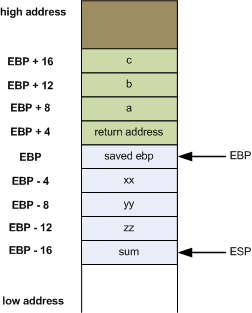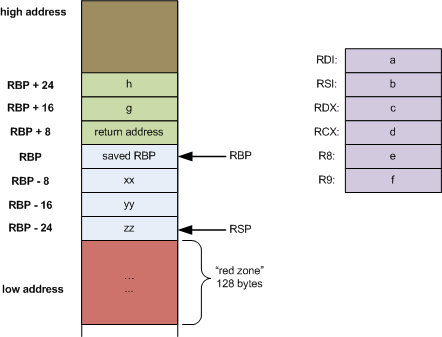Calling Conventions
x86 C Convention (cdecl)
- Arguments to the function are put on the stack (in reverse order) prior to the call of the function.
- Local variables are given space after the function is called
- Caller must preserve EAX, ECX, EDX
- Callee must preserve EBX, EDI, ESI
- Stack must be cleaned* to return

stdcall (x86 Windows)
- Exactly the same as cdecl except callee cleans up the stack
; int __cdecl func(int x, int y)
func:
mov eax, [esp+4] ; x
add eax, [esp+8] ; x += y
ret; int __stdcall func(int x, int y)
func:
mov eax, [esp+4] ; x
add eax, [esp+8] ; x += y
ret 8Uses special ret instruction that removes n bytes off the stack AFTER it pops EIP off the stack
Do not confuse this with C style returns, this has nothing to do with the return value
fastcall (x86 Windows)
- Exactly the same as stdcall except first two arguments from the LEFT go into ECX and EDX
; int __fastcall func(int a, int b, int c, int d, unsigned char e)
func:
mov eax, [esp+4] ; eax = c
add eax, [esp+8] ; eax += d
and eax, [esp+12]; eax &= e
add eax, ecx ; eax += a
add eax, edx ; eax += b
ret 12 ; why is it 12 even though e is a char?; int __stdcall func(int a, int b, int c, int d, unsigned char e)
func:
mov eax, [esp+4] ; eax = a
add eax, [esp+8] ; eax += b
and eax, [esp+12]; eax &= c
add eax, [esp+16]; eax += d
add eax, [esp+20]; eax += e
ret 20 ECX and EDX do not need to be cleaned off the stack
x64 C Convention (SYS V)
- Arguments are passed in through registers, then on the stack. First argument in RDI, then RSI, RDX, RCX, R8, R9, then stack
- Locals are same as x86 (on stack after function call)
- Caller must preserve RAX, RDX, RCX, RSI, RDI, R8-11
- Stack must be cleaned* to return

Notice the offsets to each argument are now multiples of 8 instead of 4 like in x86
- Callee must preserve RBX, RSP, RBP, R12-15
x64 C Convention (Windows)
- Arguments are passed in through registers, then on the stack. First argument in RCX, then RDX, R8, R9, then stack
- Formally: Windows x64 ABI
- Same as System V AMD64 ABI except only 4 registers used for arguments
- No more stdcall, fastcall, cdecl, etc.
Linker Name Mangling
- How does Windows know which calling convention a function is using?
_func
_func@8
@func@8
- No mangling in x64
- Names only need to be mangled for linking
- What does this mean for us?
int __cdecl func(int x, int y)int __stdcall func(int x, int y)int __fastcall func(int x, int y)Other calling conventions
The type of calling convention can vary from compiler to compiler.
- Object oriented compilers like g++ need to mangle names and pass the calling object in a register (source)
- And many others, but they all share persisting notions that are recognizable!
- Calling conventions can be changed to make reversing difficult :(